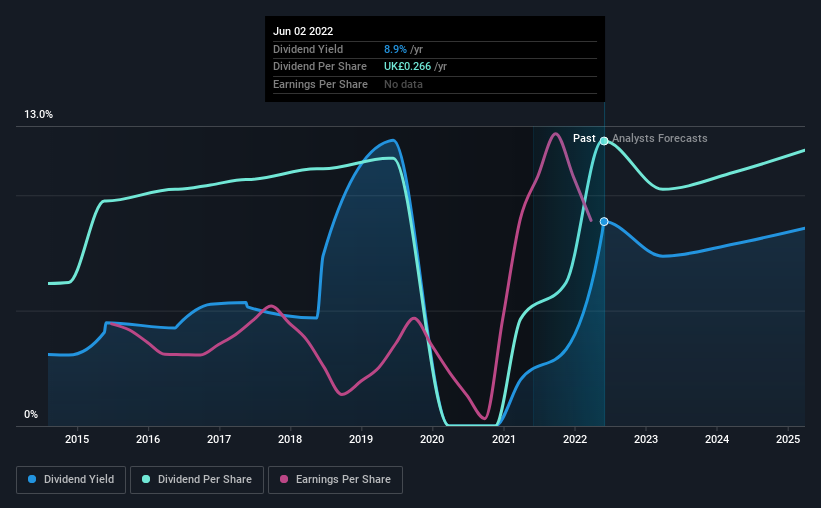Royal Mail's (LON:RMG) Upcoming Dividend Will Be Larger Than Last Year's
Royal Mail plc (LON:RMG) will increase its dividend on the 6th of September to UK£0.13. This will take the annual payment from 8.9% to 13% of the stock price, which is above what most companies in the industry pay.
View our latest analysis for Royal Mail
Royal Mail Doesn't Earn Enough To Cover Its Payments
We like to see robust dividend yields, but that doesn't matter if the payment isn't sustainable. However, Royal Mail's earnings easily cover the dividend. This means that most of its earnings are being retained to grow the business.
Looking forward, earnings per share is forecast to fall by 47.7% over the next year. If the dividend continues along recent trends, we estimate the payout ratio could reach 105%, which could put the dividend in jeopardy if the company's earnings don't improve.
Royal Mail's Dividend Has Lacked Consistency
Even in its relatively short history, the company has reduced the dividend at least once. This suggests that the dividend might not be the most reliable. Since 2014, the first annual payment was UK£0.13, compared to the most recent full-year payment of UK£0.27. This means that it has been growing its distributions at 9.1% per annum over that time. We have seen cuts in the past, so while the growth looks promising we would be a little bit cautious about its track record.
The Dividend Looks Likely To Grow
Given that the dividend has been cut in the past, we need to check if earnings are growing and if that might lead to stronger dividends in the future. Royal Mail has impressed us by growing EPS at 18% per year over the past five years. With a decent amount of growth and a low payout ratio, we think this bodes well for Royal Mail's prospects of growing its dividend payments in the future.
Royal Mail Looks Like A Great Dividend Stock
Overall, a dividend increase is always good, and we think that Royal Mail is a strong income stock thanks to its track record and growing earnings. The distributions are easily covered by earnings, and there is plenty of cash being generated as well. However, it is worth noting that the earnings are expected to fall over the next year, which may not change the long term outlook, but could affect the dividend payment in the next 12 months. Taking this all into consideration, this looks like it could be a good dividend opportunity.
Investors generally tend to favour companies with a consistent, stable dividend policy as opposed to those operating an irregular one. Still, investors need to consider a host of other factors, apart from dividend payments, when analysing a company. Case in point: We've spotted 3 warning signs for Royal Mail (of which 1 is potentially serious!) you should know about. If you are a dividend investor, you might also want to look at our curated list of high yield dividend stocks.
Have feedback on this article? Concerned about the content? Get in touch with us directly. Alternatively, email editorial-team (at) simplywallst.com.
This article by Simply Wall St is general in nature. We provide commentary based on historical data and analyst forecasts only using an unbiased methodology and our articles are not intended to be financial advice. It does not constitute a recommendation to buy or sell any stock, and does not take account of your objectives, or your financial situation. We aim to bring you long-term focused analysis driven by fundamental data. Note that our analysis may not factor in the latest price-sensitive company announcements or qualitative material. Simply Wall St has no position in any stocks mentioned.

 Yahoo Finance
Yahoo Finance 
